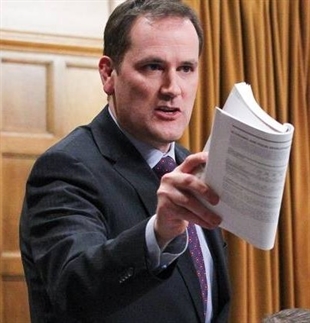
Dan Albas a Member of Parliament.
Image Credit: SUBMITTED/Dan Albas
June 09, 2018 - 12:00 PM
OPINION
“A trade war Canada will lose” has been a common theme in recent Canadian media headlines after the United States announced a tariff of 25% on Canadian steel and 10% on Canadian aluminum last week.
In response, Canada has announced targeted tariff increases on a broad range of United States manufactured goods that are imported into Canada.
Is this a full blown trade war?
At the moment it is a tariff related dispute designed to increase pressure on the NAFTA negotiations.
Having said that, I believe it is also important to be mindful of the year 2008 when the Canadian dollar not only reached parity with the US dollar, for a brief period of time it actually rose above the US dollar.
I mention that due to the fact that although the 25% tariff on steel is both punitive and in my view completely unfair to Canada, it ultimately negates the Canadian currency advantage that is currently around 23% between the United States and Canadian dollar.
This tariff approach follows a similar pattern from the United States where Canadian softwood lumber exports were hit with a tariff up to 24% essentially wiping out the currency advantage that historically works in Canada’s favour.
As I have previously commented, I believe it is also important to point out that our Prime Minister has largely shown restraint in not getting involved in USA domestic politics despite that it would be politically convenient to do so.
In fact to date, I believe most political pundits would agree that our Liberal Government has made considerable effort to work proactively with the United States administration in several areas and I believe these efforts will continue.
As the official opposition, we will continue to hold the Prime Minister to account for the failure thus far to conclude a successful new NAFTA deal with the United States.
Some in Ottawa do not like this fact however it should be pointed out that holding someone accountable to produce results for Canadians is not necessarily the same thing as assigning blame.
In this case, we have a US President who was elected in part with a promise to renegotiate trade deals such as NAFTA.
Here in Canada we have a Prime Minister who has expressed an agenda to also change trade deals and promote “progressive trade values” that to date other countries continue to strongly reject.
In my view, we should recognize that in the event our Canadian dollar returns to parity with the US dollar, either through natural market forces or through artificial means such as punitive tariffs, we will have to be able to compete.
On that note a national carbon tax and increased payroll taxes that the United States does not have will make Canada less competitive.
Recent comments from the International Monetary Fund highlights the lack of Canadian tax competitiveness compared to the USA.
I believe in the absence of a new NAFTA deal Canada needs to focus on measures that increase our international competitiveness.
To date, the Federal Government and many provinces, including British Columbia with an incoming new health employers tax, will achieve the opposite.
My question this week relates to NAFTA:
Do you believe Canada should show more flexibility to achieve a new NAFTA agreement or aggressively pursue the status quo?
I can be reached at Dan.Albas@parl.gc.ca or call toll free at 1-800-665-8711.
We welcome your comments and opinions on our stories but play nice. We won’t censor or delete comments unless they contain off-topic statements or links, unnecessary vulgarity, false facts, spam or obviously fake profiles. If you have any concerns about what you see in comments, email the editor.
News from © iNFOnews, 2018